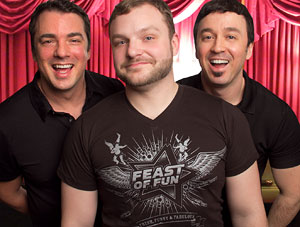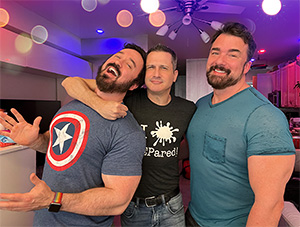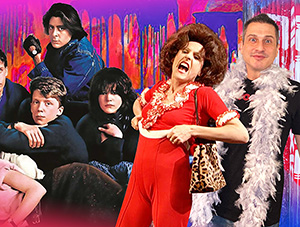FOF #1538 – Are Haters a Dying Breed?
Marc Felion
Mar 2, 2012 ·
1985 views
Premium Content
You need to be a Feast of Fun Plus+ member to access this.
Join now
or Log in – it's easy!

I know Andrew Breitbart just dropped dead, but are haters generally a dying breed?
Writer Zach Lamm joins us to talk about the changing face of sexual identity. Will people continue to idenity their sexual orientations in the near future, or is all this just a new way for guys to avoid naming it and claiming it?
 Getting a Go Go Boy Body – Danny Wilcoxx
Getting a Go Go Boy Body – Danny Wilcoxx Sleeping with the Guests
Sleeping with the Guests FOF #2959 – I’m 50 and I Like to Kick!
FOF #2959 – I’m 50 and I Like to Kick! Best of: 50 Shades of Halloween
Best of: 50 Shades of Halloween
Comments
More please!
I really enjoy your shows with Zach. It feeds both my intellectual and cub-lust sides!
And for the record, no dicks ever appeared on LOGO. Hell, you didn’t even get a non-blurred ass!
You have to take your education into your own hands. When you rack up $100K in debt on your education, you are placing a bet on yourself. I think the cost of education where it is and where it is going, in most cases you should forgo the traditional university path and make a new path, either because you don’t need a degree to do what you want to do or because you know you don’t have the income potential to pay for it. Regardless of whether you go to college or not (I’m a college dropout and a business owner/entrepreneur), you have to take your education into your own hands. If you are paying for that degree, you had better get every penny’s worth out of it. You had better be deliberate about learning the things you need to learn. If you are not paying for that degree, you can still do a lot of independent study. The information is out there. A university is just going to teach you how to find it, how to analyze it, and how to make it work for you. If you have a good head on your shoulders and you have some life experience, you probably already know how to do that, so go out there and learn.
lots of interesting topics raised in this show.
Having graduated from highschool 6 years ago, I do not know how much has changed as far as homophobia being less accepted. Although the highschool I went to was predominately white, lots of kids in conservative/religious families etc etc, so I wouldn’t be surprised if little has changed. I went to an art college, and really, I don’t ever remember seeing/hearing much homophobic happenings, it being an art college, most of the students there were much more-open minded and accepting of each other, but I think it also had a lot to do with people just not giving a fuck about about each other’s sexualities.
I think people are more over-sensitive and ready to start arguments and debates over sexual identifications, acceptance and so forth on online social communities more than anywhere else.
Ok, I can’t hold myself back, here we go. Education (the classes) should be free as it is in the interest of the whole nation that people are educated and have the skills which are necessary in their field.
Republicans in the US could not be more wrong. They always point to Europe as an example that a welfare state does not work which is not correct. The reason for countries like Greece or Portugal that they are in that mess is that they overspend, they spent too much money on consumption payed by credit. That’s why there is no easy fix for those countries. In case of Spain it is a real estate bubble just like in the US that created the economic troubles. In Italy it about political reforms which has to be implemented to make the economy more competitive, Italy may have high public debt but very low private debt and very high saving. In all those countries the welfare state has been not problem.
As a matter of fact European countries like Netherlands, Germany, Denmark, Sweden, Norway or Austria have a larger welfare states (higher taxes and higher soundings for health care, education, infrastructure) than the South European countries who are in trouble and doing economically well. Paul Krugmann also wrote about it. Not socialism is the problem but over-consumption, a real estate bubble or lack of competitiveness has been the problem in certain European countries.
I just hope when Obama wins that he will rise taxes for rich people, mainly on capital income. Back in the 1970s the tax on working and capital income was not that different. Nowadays taxes on capital income is much less in most countries in the world. Let’s say you earn $60,000 a year from a certain job then you would probably pay like 30% to 40% in taxes, depending on in which country you live. If you earn $60,000 a year from interested rates because you have some Millions on your account you just pay 15% in the US or in Germany about 25%. That is the whole problem of our system, lower taxes on capital income compared to working income. As long that is not solved the income equality will rise.
http://www.nytimes.com/2011/06/08/business/economy/08leonhardt.html?_r=1
Republicans also claim that wealth will somehow trickle down which is bullshit. The best example is India where wealth have not trickled down at all.
I just can’t understand why Americans don’t protest against that system in the US, health care and education could be easily be affordable if the tax system was changed.
Damn you autocorrect, instead correcting mistakes it just creates more mistakes. I meant “higher spending for health care…” not soundings.
I couldn’t agree more, Andy.
I should say that my comment was in regards to the higher education system being what it is (in the US), not what I think it should be.
I also agree what you wrote. The university just teaches you mainly how to find information, how to analyze it and how to use to solve your problem or get your work done. But if you already know how to do that you can also succeed in the business world without an university.
I am also fed up with the so called elite universities and the “elite” who studies there. As I have studied myself at a university which is considered the best university in Germany for business I learned to hate the so called “elite”. First of all so many of the students are superficial, very selfish and often don’t have a clue what really goes on in life. Further I noticed they often treat other people, for example certain people who work in the service industry badly which I find totally unacceptable.
Second it may pay off to study at an elite university but it does not for everybody. When I look back I would have probably chosen another way because I have gone through a lot of trouble to get my Diplom (Bachelor+Master) and it took me quite some time. Particular in 2010 as I had to deal with family issues like fighting for real acceptance in my family for being gay, it was hard to deal with the pressure from my “elite” university which quickly makes you feel like a total failure when you don’t function so that I just took some time off from the university. I also lost friends or lets say people who I thought were friends but distanced them from me when I was not always functioning or the happy, fun guy. Luckily in 2011 I found new strength and finished my master thesis and got very positive feedback in the real business world. Now I work at a friend’s company and prepare my last exam in Japanese and then I will finally get my double degree.
As I said when I look back I would have probably chosen another way, not an elite university but a normal one. Maybe my family influenced me too much. Also the German society is more traditional when it comes to education, certain degrees still count a lot and you won’t get a certain job without them even though you have the skills and the knowledge.
On the other hand the experience made me stronger, very self confident and even thought I lost some time as I could have finished my studies earlier I learned not to give up, to fight till the end and I find my own way.
For guys like you who have not chosen the traditional university path and decided to create something by themselves I have huge respect. Wish you all the best for the future of your business
That is also one reason why I respect Fausto and Marc a lot because they chose to do something which they enjoy rather than a job which gives you financial security.
Great show! Zach is very articulate, great guest! I enjoyed listening to your conversation about gay culture, now and in the past.